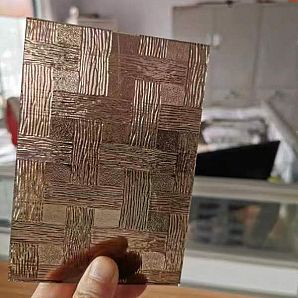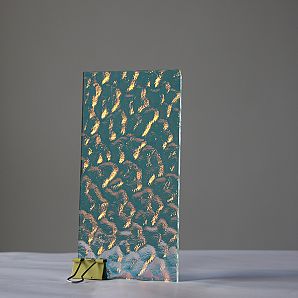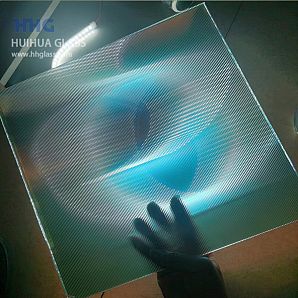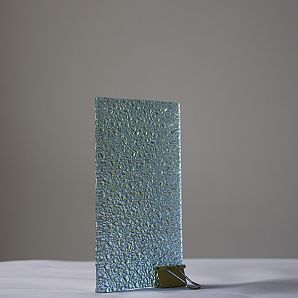Life of ordinary glass
There is no "aging" problem in the natural environment.
The chemical composition of glass is very stable. In the natural state, the glass will not be affected by sunlight, rain and fog and its performance will decline; Ordinary acid and alkali can't do harm to glass. It's clear when we think about the chemical experiment utensils when reading.
Generally, there are only two conditions that affect the service life of glass, humid air and high temperature. Continuous moist air can cause glass to mildew, but under normal temperature, the rate of glass mildew is very slow, which generally takes several months. Under normal use environment, there is little moist air lasting for several months, so glass exposed in the air will not mildew. Generally, the mildew of glass occurs in the process of overlapping storage of glass. It is easier for glass to mildew when it is stacked in a wet warehouse or exposed to rain. Generally speaking, raw glass without tempering is more likely to mildew than tempered glass.
Regardless of thermal cracking, the temperature below 300 ℃ has no effect on the life and chemical stability of the glass. However, the physicochemical properties of glass will change with the increase of temperature above 300 ℃. In terms of physical properties, general glass begins to soften at about 600 degrees. In terms of chemical properties, the increase of temperature will cause crystallization in the glass and make the glass gradually change from transparent to fuzzy. The process of glass crystallization losing transparency at 700 ℃ takes several days, and it may take months or even years at 300 ℃. At room temperature, the crystallization of glass may take tens of thousands of years, so it can not be considered.
Service life of tempered glass
Physical toughening is to heat and then quench the glass, which changes the structure between molecules in the glass; Chemical toughening is used to exchange ions on the molecular structure of glass surface at high temperature; Both methods permanently change the microstructure of glass materials. Therefore, unless there is high temperature and strong chemical action, the tempering characteristics will not decay or change with time under normal use.
Service life of insulating glass
Insulating glass is a composite product composed of glass substrate, spacer frame (aluminum strip), desiccant (molecular sieve) and sealing material (butyl rubber, polysulfide rubber or structural rubber). In the composition of insulating glass, glass and aluminum frame are usually very stable. The service life of insulating glass depends on the service life of molecular sieve and sealing material.
In the composition of the insulating glass system, the glass is very stable. We mentioned earlier that the aging of the glass substrate does not need to be considered under the condition of basically normal use; Standard hollow aluminum bars are anodized. The physicochemical properties of anodized aluminum strip are very stable under conventional conditions. Even if the aluminum strip with poor surface anodizing treatment will oxidize and make the aluminum strip lose luster during use, it has no great impact on the performance of the aluminum strip itself.
For insulating glass, we should see that the value of the construction of insulating system is that insulating glass can play the role of heat insulation and sound insulation only with a closed and dry cavity. Due to the change of ambient temperature, the gas in the hollow cavity is always in the state of expansion or compression, so that the hollow glass sealing system is always in the state of stress. At the same time, the ultraviolet, water and moisture in the environment will accelerate the aging of the sealing system, resulting in the accelerated entry of water vapor into the hollow cavity. When a large amount of water vapor appears in the hollow glass cavity, the hollow glass has failed, and the failure of the hollow glass means the end of the service life of the hollow glass. To ensure that the insulating glass does not fail, the key is the desiccant and sealing material.
As for the service life of insulating glass, the earliest glass enterprises in China gave the concept of 10-year warranty period with reference to American standards; In the national standard for insulating glass GB / t11944-2012, a reference agreement on the service life of insulating glass is put forward for the first time, and the concept of "the expected service life of insulating glass should be greater than 15 years" is put forward. In fact, the service life of insulating glass is closely related to the selection of insulating glass materials and processing technology. At the same time, it is also affected by many factors such as the composition of insulating glass layout and service environment, so it is difficult to simply quantify. For the insulating glass installed on the wall, the relatively simple measurement method is actually to measure the dew point or the air humidity of the spacer layer.
Life of Low-E glass
The service life of Low-E glass mainly depends on the service life of its hollow sealing system. We know that the main constituent materials of Low-E film are metal, alloy, metal oxide and metal nitride. Metal nitrides are generally used as protective layers in film structures, and their properties are very stable. Metal oxide and alloy layers are generally used as dielectric layers to connect silver layer and protective layer, and their properties are relatively stable. The silver layer in Low-E is relatively active, but its oxidation is conditional and water vapor is required.
Therefore, as long as the insulating glass does not fail, it is basically unnecessary to consider the service life of Low-E film separately.
Life of laminated glass
Laminated glass is a composite glass product in which one or more layers of organic polymer intermediate film are sandwiched between two pieces of glass. After process treatment, the glass and the intermediate film are permanently bonded into one. Even if the laminated glass is broken, the fragments will be stuck to the film, which effectively prevents the occurrence of fragment puncture and penetration falling events and ensures personal safety.
The service life of laminated glass mainly depends on the material of interlayer. Normally, wet laminated glass and EVA laminated glass are mainly used for indoor partition, not for building doors, windows or curtain walls. Wet laminated glass and EVA laminated glass will accelerate aging under sunlight, yellowing will occur after 1-2 years, and degumming bubbles, ice flowers and fog will appear successively in 2-3 years. Generally speaking, the aging speed of wet laminated glass is much faster than that of EVA laminated glass. EVA laminated glass avoids direct sunlight and can have a service life of more than 10 years when used indoors.
PVB and SGP laminated glass usually used as doors, windows or curtain walls has much better aging resistance. The most typical failure of laminated glass PVB and SGP is glue opening, which means that the glass is separated from the interlayer and loses the safety characteristics of laminated glass. At present, there are no relevant standards and specifications for the service life of PVB and SGP laminated glass in China. At present, domestic glass processing enterprises generally refer to the relevant materials of foreign PVB and SGP suppliers to give a product warranty period of 5-7 years.
In fact, the service life of PVB and SGP laminated glass is greatly affected not only by the material of the intermediate layer, but also by the thickness of the intermediate layer, the quality of the laminated glass substrate and the process control of the laminated glass.







